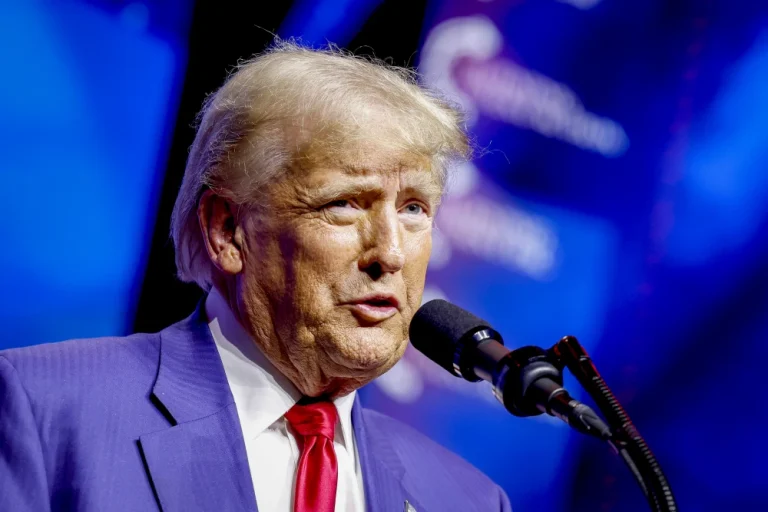WASHINGTON — Republican presidential candidate Donald Trump filed a lawsuit against CBS on Thursday, claiming the network aired a misleading interview with his Democratic rival, Kamala Harris, during its “60 Minutes” program in early October.
The lawsuit, submitted in federal court in the Northern District of Texas, contends that CBS presented two different responses from Harris to a question regarding the conflict between Israel and Hamas in Gaza.
According to the complaint, the version aired on “60 Minutes” on October 6 omitted what the lawsuit describes as a “word salad” response from Harris about the Biden administration’s influence over Israel’s actions in the conflict. A CBS News spokesperson responded, stating, “Former President Trump’s repeated claims against 60 Minutes are false. The lawsuit he has brought today against CBS is completely without merit, and we will vigorously defend against it.”
As Trump and Harris prepare for what polls indicate is a competitive race leading up to Tuesday’s U.S. presidential election, the tension between them has intensified. The suit demands a jury trial and seeks approximately $10 billion in damages, alleging violations of Texas law prohibiting deceptive business practices.
Throughout his campaign, Trump has criticized CBS for this interview, claiming it misrepresented Harris’s comments. He has even suggested that if elected, he would consider revoking CBS’s broadcasting license due to what he perceives as unfair coverage.
The controversy comes amid a broader narrative where Trump has consistently attacked media outlets he believes are biased against him. His supporters often rally around these claims, arguing that mainstream media distorts facts to undermine Republican candidates.
Harris’s responses during the interview have drawn scrutiny from various quarters, with some political analysts arguing that her comments were indeed complex and could be interpreted in multiple ways. The differing representations of her responses highlight the ongoing challenges of media interpretation in political discourse.
CBS has maintained that Trump himself chose not to participate in a planned interview with “60 Minutes,” which adds another layer of complexity to the current feud. This situation underscores the contentious relationship between the Trump campaign and major news networks.
In his pursuit of damages, Trump is tapping into a growing frustration among his base regarding perceived media bias. The legal action reflects a strategy to confront what he views as unfair treatment in the media landscape.
As the election approaches, both candidates are navigating a charged atmosphere filled with accusations and counterclaims. Trump’s lawsuit against CBS could resonate with voters who feel that media plays a manipulative role in shaping political narratives.
Legal experts suggest that Trump’s lawsuit may face significant hurdles, particularly in proving the deceptive practices he alleges. The burden of proof will rest on his ability to demonstrate that CBS acted with malice or gross negligence.
While media outlets are typically granted a wide berth in terms of editorial discretion, the outcome of this case could have implications for how political interviews are conducted and reported in the future.
Trump’s frequent criticisms of media outlets have become a cornerstone of his campaign strategy, galvanizing his supporters while alienating others who prioritize factual reporting. His approach underscores a broader trend where candidates seek to control their narratives amidst hostile media environments.
As the situation develops, observers will be watching closely to see how it impacts the upcoming election. The interplay between Trump’s legal challenges and Harris’s responses may play a critical role in shaping voter perceptions.
Ultimately, this lawsuit reflects a deeper divide in American politics, where media portrayals significantly influence public opinion. Both candidates will need to navigate these challenges as they strive to secure voter trust and support.
In a polarized environment, Trump’s legal action against CBS may serve to rally his base further while raising questions about the integrity of political journalism in the digital age. As both sides brace for the impending election, the stakes continue to rise.
The clash between Trump and Harris encapsulates the fierce battles that characterize modern political campaigns, with media serving as both a battleground and a weapon. As the legal proceedings unfold, the implications for both candidates could be substantial.
This ongoing saga illustrates the complexities of political communication, where every interview and statement is scrutinized and weaponized. Trump’s bold legal move against CBS is emblematic of the high-stakes game of contemporary politics.
As the narrative unfolds, voters will be left to discern the truth amidst the noise, navigating a landscape where media narratives and political realities often collide. The outcome of this case may have far-reaching effects beyond the immediate election cycle.

